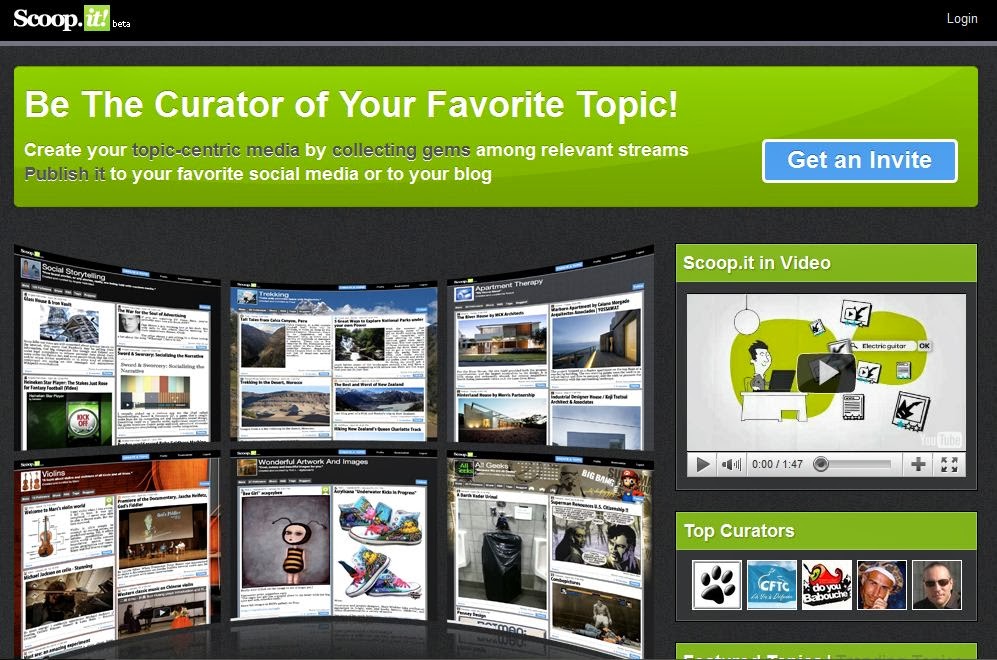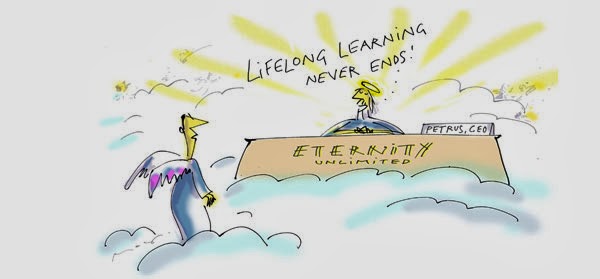According to the sequence of the syllabus, I created my DIIGO account first. After bookmarking several websites, I found it more like a new-fashion book mark and collage. Also, because DIIGO is a bookmarking website and it is most useful when you enjoy browsing lots of web pages and wanting to add bookmarks on them. What's more, we can find someone of the similar interests and follow others' bookmarking and share with each other. In a word, DIIGO is like a tapestry of everything that you are interested in your acquaintances with the internet and others.
After I creating the DIIGO account, I started finish the Scoop.it assignment. I created a topic and some labels, then it comes out many related suggestions. Their are websites, videos, blogs, etc. They are in a sequence of relevancy. Then I select a few from those suggestions and made my own topic. Also, I followed some of my classmates' topic. Scoop.it is called 'content curation', which is pretty like to created your own thematic library and organize your own content choices.
In DIIGO, you can highlight anything, add multiple tags, copy and paste from original article as comments, follow others, and be followed by others. But you cannot comment on others book marks.
While in Scoop.it, you cannot highlight but you can use multiple tags, copy and paste from original articles as comments and others can also post comments. People cannot follow each other but they can follow specific topics.
As for my preferences, I like both of them. DIIGO and Scoop.it is somewhat two reverse website.
DIIGO is a tool for readers with a wide spectrum who like to find contents they like and usually with less motivation. They find things that attracts to them and add tags. It's kind of tagging way for less motivated and relaxed way of reading.
While for Scoop.it, it's a content curating website which means you are the curator of your own thematic library. You gotta choose your own topics and hobbies. You don't even need to create your own topic just follow others would be efficient. It's more like a kind of information search that with a specific theme. And I like the suggestions particularly and the daily update emails for your chosen topics.
As for the advantage of both websites, they allow users to follow interesting topics and each other. The internet is making our life more interactive.
Monday, February 24, 2014
Monday, February 17, 2014
Learn Whenever and Wherever You Feel Like It
Upon watching RSA Animation- Changing Education Paradigms, 21st Century Education in New Brunswick, and Social Media Revolution 2011, I was quite shocked. Before I see these videos I didn't realize how internet would bring to education field.
Firstly, the accessibility of future education. The always accessible internet provides good resources that are always available. Accessibility also means that the information flow direction has changed. Long time before the internet age, the knowledge is from the book and the teacher to the students. But in this information age, students can bring all kinds of resources to them. In this information age, students don't need Ritalin to stay focused for knowledge feeding. Instead, they should be woken up to seek their knowledge they want to learn anytime!
Firstly, the accessibility of future education. The always accessible internet provides good resources that are always available. Accessibility also means that the information flow direction has changed. Long time before the internet age, the knowledge is from the book and the teacher to the students. But in this information age, students can bring all kinds of resources to them. In this information age, students don't need Ritalin to stay focused for knowledge feeding. Instead, they should be woken up to seek their knowledge they want to learn anytime!
Just like the IT guy Harold Finch in TV series 'Person of Interest' says, 'if the university is not available, I'll bring information to me'. This quote somewhat shows the change of education because of this information age, that the information is not mono-directioned but bi-directioned, which means more interactive and more user-based. What's more, students can tailor the time and situations for themselves in their education.
Secondly, the lifelong learning is made more possible because of the popularity of internet. You can choose your own classes by registering an online course, using an interactive learning software, etc.
Like my experience with my Rosetta Stone software, I find myself talk much more than my English learning experiences in China. Technologies do change education, they make a real equality in education and solely consider the 'desire of learning' and not let other factors baffle the learners.
In conclusion, technologies help us learn with more efficiency and more equality. It is surely a revolution in education and make it a interactive process.
Subscribe to:
Posts (Atom)




